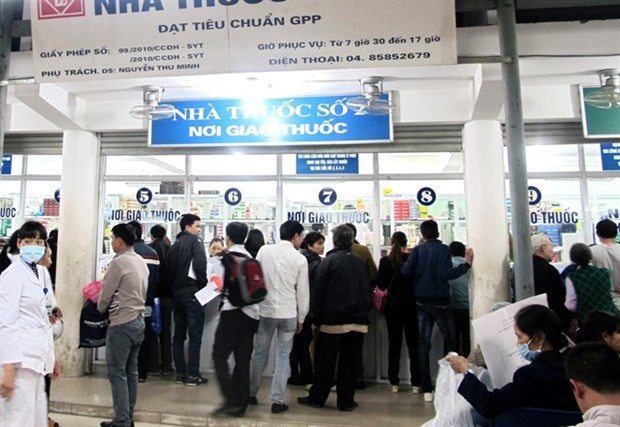
Patients buy drugs at a drug store in Bach Mai Hospital in Hanoi.
The PM also called on the health sector to clearly define the roles and responsibilities of relevant ministries, sectors and agencies to fix the issue.
PM Chinh said that regulations cannot cover all aspects of life as there are often fast, unpredictable and unprecedented developments.
Therefore, he said that the ministries, sectors and localities must update the situation and timely make policy responses so as to not affect people's health and socio-economic activities.
He also directed the Ministry of Health and the Ministry of Finance to propose amendments to regulations on bidding and procurement of drugs, medical equipment and supplies to create favourable conditions for localities to actively buy the most cost-effective medical equipment, not just the cheapest.
Currently, shortcomings in legal mechanisms and a lack of law provisions on bidding are blamed for a prolonged shortage of drugs and medical equipment in medical facilities in the country.
Nguyen Thi Ngoc Bao, Deputy Director of the National Centre for Centralised Drug Procurement, spoke with Kinh te & Do thi (Economic and Urban Affairs) online newspaper about the organisation of bidding and procurement of drugs and medical equipment at facilities that are still facing problems.
About 90 per cent of legal documents fail to keep up with the real situation. Bao added that bureaucracy is one of the reasons for the current shortage of drugs and medical supplies.
Nguyen Huy Quang, former Director of the Legal Department under the Ministry of Health, said many enterprises are not interested in bidding to supply drugs and medical equipment to facilities because the price of drugs is now very high, and they cannot earn profits.
Deputy Minister of Health Nguyen Thi Lien Huong said the global supply chain is broken, and the prices of input materials are increasing. They are believed to be the reasons for the shortage of drugs and medical equipment.
Besides, some countries have applied anti-inflation measures, which have also affected the supply and prices of drugs, equipment and medical supplies, she said.
She said that the health ministry has proposed short- and long-term solutions to solve the shortage of drugs and medical equipment.
The short-term solution is that the ministry is speeding up the licensing process for drug and medical equipment procurement; accelerate the progress of drug bidding packages; amend relevant documents under the ministry's authority, she said.
In the long term, the ministry is proposing amendments and supplements to the Law on Medical Examination and Treatment, the Law on Health Insurance, the Law on Medical Equipment and the Law on Pharmacy, she added.
Prolonged shortages
Data from the Ministry of Health showed that 28 out of 34 health departments and 12 out of 21 central-level hospitals nationwide face shortages of drugs; 26 out of 34 health departments and 15 out of 21 central-level hospitals reported a shortage of medical consumables and chemicals.
Head of the Vietnam Social Security's Department of Health Insurance Implementation, Le Van Phuc, said the lack of drugs and medical supplies in hospitals is directly affecting patients.
He said there would be many issues, such as whether or not the quality of drugs and medical supplies outside the hospital is guaranteed when patients have to buy drugs and medical supplies by themselves.
In addition, the price of drugs is also different in other drug stores.
These things affect the interests of the patients, he said.
Nguyen Cong Huu, Director of Hanoi-based E Hospital, said the current shortage of drugs and medical supplies had caused public concern. The lack of drugs and medical supplies not only affects patients but also affects hospitals' revenue.
Bach Mai Hospital has a great demand for drugs, medical equipment, and supplies as the hospital receives many patients every day.
However, statistics from the hospital show that 18 companies that won bids to provide drugs and medical supplies to the hospital have failed to supply enough drugs and medical supplies to meet demand.
In Ho Chi Minh City, representatives of 25 drug suppliers and 33 public health units recently pointed out difficulties in bidding for drug supply.
For example, many regulations need to be clearer and consistent. Meanwhile, there needs to be adequate drug price management regulations to prevent prices from being distorted./. VNS